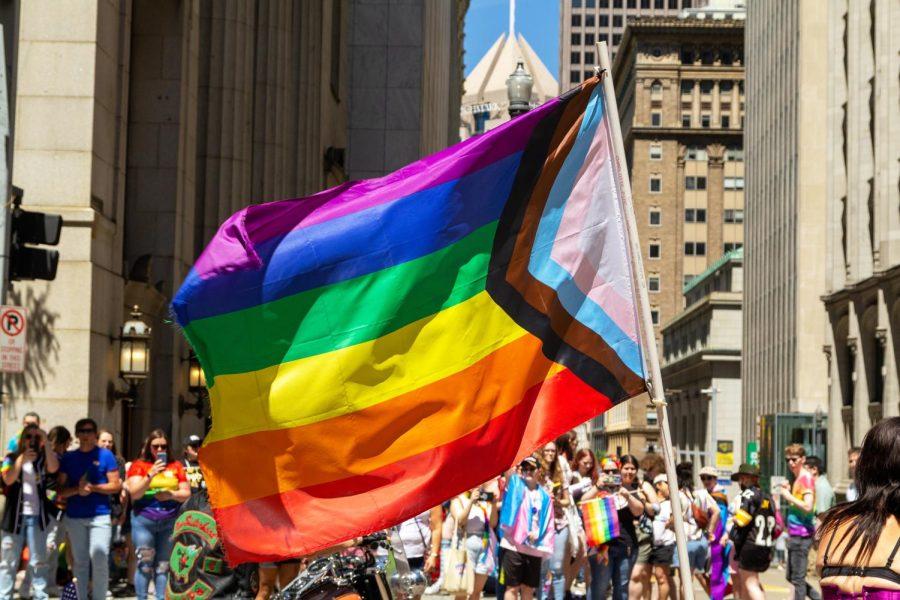Editorial | Anti-LGBTQ+ rhetoric is killing people
John Blair | Senior Staff Photographer
Attendees march Downtown during the Pittsburgh Pride Revolution March & Parade on Saturday, June 4.
November 27, 2022
On Nov. 19, a person arrived at Club Q in Colorado Springs, Colorado and immediately opened fire. The shooting occurred the day before Transgender Remembrance Day — a day dedicated to honoring murdered trans people.
The attack left five people dead — Daniel Aston, Raymond Green Vance, Kelly Loving, Ashley Paugh and Derrick Rump — and at least 19 more wounded. While prosecutors determine the motive and try the appropriate charges, many are speculating that the alleged shooter carried out the attack as a hate crime.
Although the alleged shooter Anderson Aldrich identified as nonbinary in a court filing last week, a neighbor recalled them expressing homophobic sentiments, possibly adopted from their father, who sparked outrage when he said his child “was only a mass murderer and not a homosexual.” Aldrich’s father also expressed relief when he found out his child was not a Club Q patron.
Homophobic rhetoric used anywhere is dangerous, but when it’s used at home, it greatly influences a child’s perception of LGBTQ+ people during their formative years. It’s what makes “Parental Rights in Education” bills so concerning, since the existence of LGBTQ+ people can be erased at home and school instead of allowing children — regardless of how parents manipulate reality — to tolerate and hopefully respect queer and trans people. Despite the Centers for Disease Control and Prevention reporting in 2020 that LGBTQ+ kids were more likely to experience bullying than cisgender kids, and the fact that some LGBTQ+ children fear going to school, some parents have inspired and requested legislation aimed at stripping not only these kids’ rights, but their identities too.
A Gallup poll from February reports that 7.1% of Americans identify as LGBT+ and 1 out of 5 Generation Z adults identify in the community as well. The figure increased from 5.6% in 2020, showing more people embracing their sexual orientation and full gender identity. Although people identify within the trans and queer community more than ever before, violent acts are still a reality for so many.
Data collected from Human Rights Campaign and Center for Countering Digital Hate reported that after Florida’s “Don’t Say Gay” bill passed in March, online anti-LGBTQ+ harassment increased by 406%. It’s a terrifying statistic, especially when you consider that more than a dozen other states are trying to also pass their own versions of Florida’s anti-LGBTQ+ bill.
LGBTQ+ people are gaining more recognition and representation in the general public and media, yet they still face discrimination, harassment and even death as this shooting demonstrated once again, retraumatizing the community. The second deadliest mass shooting in the U.S. occurred in 2016 at the Pulse nightclub, a gay club in Orlando that left 49 people dead and dozens more wounded. Now, six years later the queer and trans community still mourns this horrific hate crime.
Club Q is the only gay club in Colorado Springs and the mayor even described it as a “safe haven” in the community. Many LGBTQ+ people now fear that they have nowhere left to go, but the local Colorado Springs community and wider national LGBTQ+ community have shown an outpouring of support.
We live in 2022, so why does it feel like 1969, when trans and queer people, especially people of color, defended the right of LGBTQ+ people to occupy space by throwing the first bricks at the Stonewall Inn? We should no longer live in a society where revolution is the way for queer and trans people to enjoy the safe spaces they deserve. Until the expansive attacks on the community stop, more people will die, but it’s an epidemic that can be stopped. People just need to demonstrate willingness to let people live… will you?



